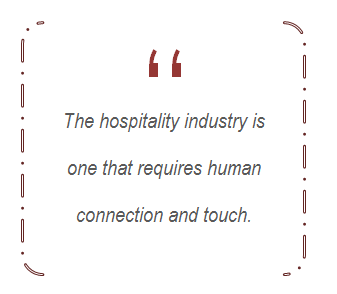Debunking workforce myths of the hospitality industry

In this 21st century, the global economy is highly dependent and driven by three major industries, one of which is the tourism industry (for the curious, IT/telecoms and financial services are the other two).
|
With Singapore ranked as one of most visited countries by tourists last year, the tourism industry contributed over US$17.02 billion to the economy.
The hospitality industry works hand in hand with tourism and both industries are responsible for creating diversified opportunities across diverse sectors from hotel/cruise, to food and beverage (F&B), as well as airline and travel agencies.
Despite the great progress made in the hospitality industry, there are always myths and misconceptions that linger and must be debunked in order to continue to attract bright young talent to develop even further.
Myth 1: Technology will take over jobs
Over the past few years, technology improvements have been a key driver for increased productivity because it has the potential to improve and alter the way we undertake manual jobs and drive efficiency.
Hotels, for example have deployed automated luggage collection and delivery to speed up the check-in process. Such technology improves efficiency, boosts an organisation’s productivity and assists with streamlining certain internal processes, especially when the industry is experiencing labour shortages and the domestic talent pool is aging or unwilling to undertake manual jobs.
Such improvements will not be able to replace employees who provide the personalised experience that most travelers expect.
The hospitality industry is one that requires human connection and touch. Technology can handle manual work, freeing employees to perform more important tasks such as providing more personalised services to guests.
This results in increased job satisfaction as well as better customer service experiences. Truly a win-win situation.
 Myth 2: The hospitality industry does not pay well
Myth 2: The hospitality industry does not pay well
There have been persistent rumours that a career in the hospitality industry does not pay well. However, the truth is that the industry offers highly competitive salaries, even for entry-level positions.
AsiaHospitalityCareers.com, Asia’s first hospitality career site, recently launched its first ever salary guide for hospitality jobs in Singapore. An entry-level Chef in the F&B sector can expect an average salary of $2,300-$3,000 and an entry-level Cabin Crew in the airline sector can expect an average salary of $3,000-$3,500.
These figures are significantly higher as compared to the entry level positions in the Customer Service sector where Call Centre Officers can expect an average salary of $1,800-$2,500; and an entry level Warehouse Assistant in the Supply Chain and Logistics Industry can expect an average salary of $1,400-$2,500.
To view compensation purely on financials alone, the industry already looks highly competitive.
Myth 3: The industry offers limited career prospects
The hospitality industry is not limited to one career option. Job seekers can pick from a wide variety of career paths.
If we compare functions that are in demand across all industries such as IT, human resources, accounting or sales and marketing, it quickly becomes clear that salaries are market competitive, with the additional benefits that are unique to the hospitality industry.
For example, it’s quite common for meals and/or transportation to be provided by employers in the hospitality industry.
Beyond financials and on a developmental level, skills acquired within the industry can be applied regardless of location – facilitating a potential international career if desired.
For example, a chef working in a hotel in Singapore can apply his or her skills to be a chef in any part of the world.
In addition, a subsidised skills framework for hotels and accommodation services are also in place to help employers offer better training and develop both horizontal and vertical career pathways for their employees.
The nature of the industry is perfectly poised to take advantage of global and regional markets to scale the workforce.
Furthermore, the varied nature of the jobs in the industry make for a very enriching learning experience for any hungry candidate looking to work in one of the world’s most dynamic industries.
Myth 4: Hospitality does not contribute much to the economy
Singapore’s hospitality industry continues to make steady progress and the country remains an exciting destination for visitors around the world.
In 2017, the Travel & Tourism industry in Singapore directly supported 169,500 jobs (4.6% of total employment) and this number is expected to rise by 1.2% pa to 194,000 jobs (5.0% of total employment) in 2028.
Investments into Singapore’s hospitality industry amounted to $20 billion in 2017 and are set to increase in the coming years.
Such figures are very encouraging and indicate to those employed in the industry as well as job seekers that the hospitality industry is the hottest career ticket in town and will continue a strong upward path in the years to come.
Myth 5: There’s no work-life balance
Work-life balance is something that every employee strives for. People tend to believe that once they embark on a career in the hospitality industry, their life will be consumed by work with little to zero free time.
Even though the hospitality industry is described as ‘an industry that never sleeps’, employees are given flexibility in their work schedules.
Shift hours and large numbers of accumulative annual leave ensure more free time for employees. These flexible schedules, balanced with the help of technology, means employees are also able to manage their time better and work smarter.
With Singapore’s strategic location as the gateway to Asia, the country continues to be one of the key destinations that supports tourism in both the leisure and MICE industries.
With anticipated developments and shifting customer demographics, the hospitality industry is set to evolve at a rapid pace over the coming years making it the perfect place to be to build a long lasting career with plenty of exciting prospects.




